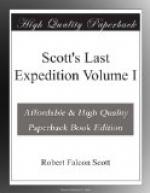Tuesday, August 29.—I find that the card of the sunshine recorder showed an hour and a half’s burn yesterday and was very faintly marked on Saturday; already, therefore, the sun has given us warmth, even if it can only be measured instrumentally.
Last night Meares told us of his adventures in and about Lolo land, a wild Central Asian country nominally tributary to Lhassa. He had no pictures and very makeshift maps, yet he held us really entranced for nearly two hours by the sheer interest of his adventures. The spirit of the wanderer is in Meares’ blood: he has no happiness but in the wild places of the earth. I have never met so extreme a type. Even now he is looking forward to getting away by himself to Hut Point, tired already of our scant measure of civilisation.
He has keen natural powers of observation for all practical facts and a quite prodigious memory for such things, but a lack of scientific training causes the acceptance of exaggerated appearances, which so often present themselves to travellers when unfamiliar objects are first seen. For instance, when the spoor of some unknown beast is described as 6 inches across, one shrewdly guesses that a cold scientific measurement would have reduced this figure by nearly a half; so it is with mountains, cliffs, waterfalls, &c. With all deduction on this account the lecture was extraordinarily interesting. Meares lost his companion and leader, poor Brook, on the expedition which he described to us. The party started up the Yangtse, travelling from Shanghai to Hankow and thence to Ichang by steamer—then by house-boat towed by coolies through wonderful gorges and one dangerous rapid to Chunking and Chengtu. In those parts the travellers always took the three principal rooms of the inn they patronised, the cost 150 cash, something less than fourpence—oranges 20 a penny—the coolies with 100 lb. loads would cover 30 to 40 miles a day—salt is got in bores sunk with bamboos to nearly a mile in depth; it takes two or three generations to sink a bore. The lecturer described the Chinese frontier town Quanchin, its people, its products, chiefly medicinal musk pods from musk deer. Here also the wonderful ancient damming of the river, and a temple to the constructor, who wrote, twenty centuries ago, ‘dig out your ditches, but keep your banks low.’ On we were taken along mountain trails over high snow-filled passes and across rivers on bamboo bridges to Wassoo, a timber centre from which great rafts of lumber are shot down the river, over fearsome rapids, freighted with Chinamen. ‘They generally come through all right,’ said the lecturer.
Higher up the river (Min) live the peaceful Ching Ming people, an ancient aboriginal stock, and beyond these the wild tribes, the Lolo themselves. They made doubtful friends with a chief preparing for war. Meares described a feast given to them in a barbaric hall hung with skins and weapons, the men clad in buckskin dyed red, and bristling with arms; barbaric dishes, barbaric music. Then the hunt for new animals; the Chinese Tarkin, the parti-coloured bear, blue mountain sheep, the golden-haired monkey, and talk of new fruits and flowers and a host of little-known birds.




